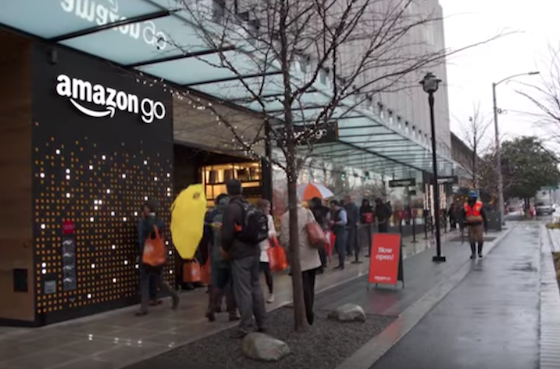In the retail world, there’s an attempt being made to regain its market share by following the lead of Amazon with its use of technology. The major goal is saving the store as a place where people go and shop, rather than ordering everything online for delivery.
Below, the Amazon Go store offers a modern do-it-yourself checkout where shoppers just choose items they want and the cost is tallied up and deducted on their smart phones.

Here is Amazon’s explainer video about how the Go store works:
The article below, reprinted from the New York Times, explains how retailers and others “are motivated to shave labor costs” which points out the eventual catastrophic job loss that will come with automation across workplaces from agriculture [1] to manufacturing [2] and retail [3].
According to the US Bureau of Labor Statistics, retail workers account for millions of jobs. Statistics from earlier this year reported that 4,854,300 persons worked in retail sales in 2016 [4].
So America won’t need any more immigrants when all sorts of jobs are disappearing because of automation [5], right? We will have enough trouble finding jobs for citizens.
Retailers race against Amazon to automate stores [6], SFGate.com, April 2, 2018
SEATTLE — To see what it is like inside stores where sensors and artificial intelligence have replaced cashiers, shoppers have to trek to Amazon Go, the Internet retailer’s experimental convenience shop in downtown Seattle.
Soon, though, more technology-driven businesses like Amazon Go may be coming to them.
A global race to automate stores is under way among several of the world’s top retailers and small tech startups, which are motivated to shave labor costs and minimize shoppers’ frustrations, like waiting for cashiers. They are also trying to prevent Amazon from dominating the physical retail world as it does online shopping.
Companies are testing robots that help keep shelves stocked, as well as apps that let shoppers ring up items with a smartphone. High-tech systems like the one used by Amazon Go completely automate the checkout process. China, which has its own ambitious e-commerce companies, is emerging as an especially fertile place for these retail experiments.
If they succeed, these new technologies could add further uncertainty to the retail workforce, which is already in flux because of the growth of online shopping. An analysis last year by the World Economic Forum said 30 to 50 percent of the world’s retail jobs could be at risk once technologies like automated checkout were fully embraced.
In addition, the efforts have raised concerns among privacy researchers because of the mounds of data that retailers will be able to gather about shopper behavior as they digitize their locations. Inside Amazon Go, for instance, the cameras never lose sight of a customer once he or she enters the shop.
Retailers had adopted technologies in their stores long before Amazon Go arrived on the scene. Self-checkout kiosks have been common in supermarkets and other stores for years. Kroger, the grocery chain, uses sensors and predictive analytics tools to better anticipate when more cashiers will be needed.
But the opening of Amazon Go in January was alarming for many retailers, who saw a sudden willingness by Amazon to wield its technology power in new ways. Hundreds of cameras near the ceiling and sensors in the shelves help automatically tally the cookies, chips and soda that shoppers remove and put into their bags. Shoppers’ accounts are charged as they walk out the doors.
Amazon is now looking to expand Go to new areas. An Amazon spokeswoman declined to comment on its expansion plans, but the company has a job posting for a senior real estate manager who will be responsible for “site selection and acquisition” and field tours of “potential locations” for new Go stores.
“Unanimously, there was an element of embarrassment because here is an online retailer showing us how to do brick and mortar, and frankly doing it amazingly well,” said Martin Hitch, the chief business officer of Bossa Nova Robotics, a company that makes inventory management robots that Walmart and others are testing.
(Continues)